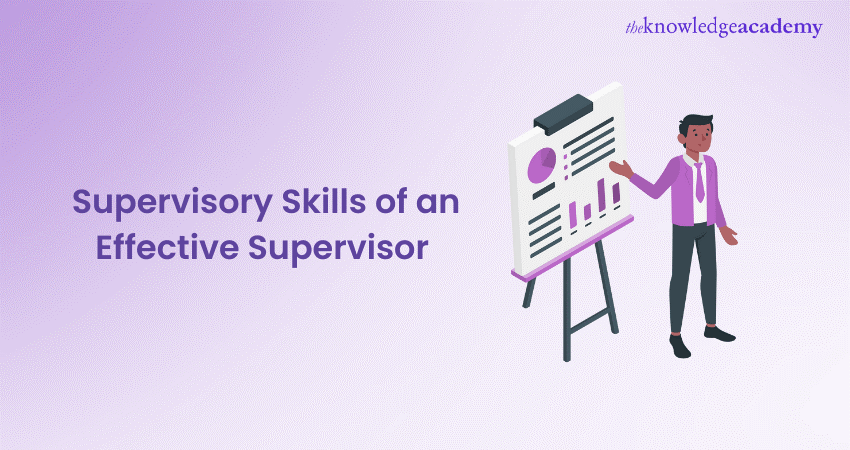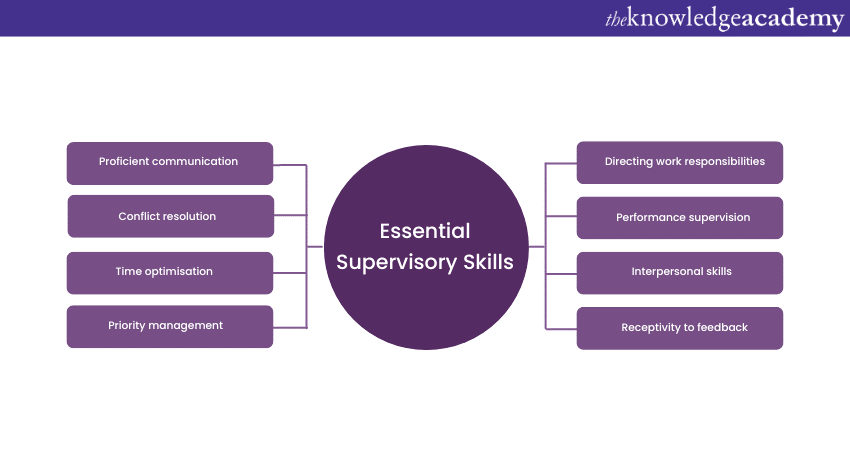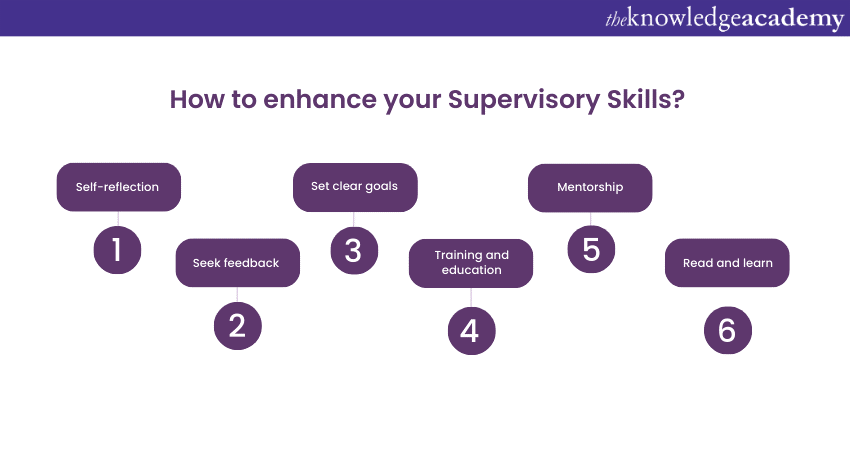We may not have the course you’re looking for. If you enquire or give us a call on +47 80010068 and speak to our training experts, we may still be able to help with your training requirements.
Training Outcomes Within Your Budget!
We ensure quality, budget-alignment, and timely delivery by our expert instructors.

Supervisors play a pivotal role in any organisation. They are responsible for managing teams, ensuring productivity, and maintaining a positive work environment. But do you know how do they manage so many tasks? To be an effective Supervisor, one must possess a diverse set of Supervisory Skills. In this blog, you will explore the top 12 Supervisory Skills of an Effective Supervisor. So, keep reading this blog and learn more!
Table of contents
1)What are Supervisory Skills?
2) Essential Supervisory Skills
a) Proficient communication
b) Conflict resolution
c) Time optimisation
d) Critical thinking
e) Priority management
f) Acknowledgment of diversity
g) Problem solving
h) Directing work responsibilities
I) Performance supervision
j) Interpersonal skills
k) How to enhance your Supervisory Skills
3) Conclusion
What are Supervisory Skills?
Supervisory Skills refer to the abilities and competencies that individuals, typically in a managerial or leadership role, use to oversee, guide, and manage the work of others. These Skills are essential for maintaining a productive and efficient work environment. Thus, a Supervisor ensures that tasks are completed successfully and supports the development and well-being of employees.

Essential Supervisory Skills
Let's dive deep into the communication skills required by a Supervisor:

Proficient communication
Let's deep dive into communication skills required by a Supervisor:
1) Clear and concise communication: Effective Supervisors must communicate clearly and directly. They must ensure that their instructions and expectations are easily understood by team members. Moreover, they must avoid jargon or overly complex language.
2) Active listening: Good communication involves not only speaking but also listening. Supervisors should actively listen to their team members, show empathy, and be open to their concerns and ideas.
3) Providing constructive feedback: Supervisors should be able to provide feedback in a constructive and supportive manner. This includes both positive reinforcement for good performance and guidance for improvement.
Conflict resolution
Let's explore conflict resolution skills in detail:
1) Identifying conflicts: Supervisors must recognise when conflicts arise within their teams. This could be disagreements between team members, disputes over resources, or differences in work styles.
2) Mediation and resolution: The ability to mediate disputes and facilitate conversations that lead to conflict resolution is crucial. This involves remaining impartial and helping the parties involved find common ground.
3) Creating a harmonious work environment: Successful conflict resolution promotes a harmonious work environment where team members can collaborate effectively without lingering tensions.
Ready to master the art of dealing with difficult people? Join our Dealing With Difficult People Course today and unlock effective strategies for smooth interactions and conflict resolution!
Time optimisation
The following are the essential time optimisation skills for enhanced productivity:
1) Prioritisation: Supervisors must prioritise tasks based on their importance and urgency. They need to identify what needs to be done first to ensure that critical goals are met.
2) Setting and meeting deadlines: Meeting deadlines is essential for maintaining productivity and keeping projects on track. Supervisors should set realistic timelines and ensure that their team adheres to them.
3) Resource allocation: Supervisors should allocate resources, including time, money, and manpower, effectively to complete tasks and projects within the constraints of the available resources.
Maximise your productivity and reclaim your time – register for our Time Management Training now to boost your efficiency and achieve your goals!
Critical thinking
The following are the essential critical thinking skills:
1) Analysing situations: Critical thinking involves the ability to objectively assess situations, problems, or challenges by breaking them down into their component parts and understanding the underlying issues.
2) Evaluating information: Supervisors must evaluate the information available to them. They must consider the credibility, relevance, and significance of the data.
3) Making well-informed decisions: Critical thinking skills enable Supervisors to make well-informed decisions. By weighing the pros and cons of various options and considering potential consequences, they can make better decisions.
Priority management
The following are the essential priority management skills required for a Supervisor to possess:
1) Identifying urgent tasks: Supervisors should differentiate between urgent tasks and important but less time-sensitive tasks. Urgent tasks require immediate attention.
2) Resource allocation: They must properly allocate resources to tasks based on their priority. They must ensure that important objectives are not neglected in favour of less critical ones.
3) Efficiency: Priority management helps Supervisors and their teams work efficiently, ensuring that they focus their efforts on what matters most.
Acknowledgment of diversity
The following are the essential acknowledgement of diversity skills:
1) Cultural sensitivity: Supervisors should be culturally sensitive and aware of the diversity in their team. They should respect and value differences in culture, background, and perspectives.
2) Inclusivity: Acknowledging diversity involves creating an inclusive work environment where all team members feel comfortable, valued, and respected, regardless of their background or characteristics.
3) Equity: Supervisors should ensure that all team members have equal opportunities and access to resources, promotions, and career development. Thus, they should focus on promoting equity in the workplace.
Problem solving
The following are the essential problems solving skills:
1) Identifying issues: Problem-solving starts with identifying and defining problems or challenges. Supervisors need to recognise when something is amiss or when a goal is not being met.
2) Analysing root causes: To find effective solutions, Supervisors must analyse the root causes of the problems. They must understand the root cause and factors contributing to these problems.
3) Developing effective solutions: Once the problems are understood, Supervisors should develop practical and effective solutions to address them. This may involve brainstorming, collaboration, and creativity.
Directing work responsibilities
The following are some Skills of Supervisors that can help in directing clear and effective work responsibilities:
1) Delegation: Supervisors need to delegate tasks and responsibilities effectively. This means assigning the right tasks to the right team members based on their skills and capabilities.
2) Setting expectations: Clear communication of expectations is essential. Supervisors should outline the specific roles and responsibilities of team members, along with any relevant deadlines or quality standards.
3) Monitoring Progress: After delegating responsibilities, supervisors should monitor the progress of tasks to ensure they are being completed on time and according to expectations. This can involve regular check-ins, project tracking, and feedback.
Enhance your organisational skills for a more efficient and successful career – register for our Organisational Skills Course today!
Performance supervision
The following are the essential performance supervision skills:
1) Setting clear expectations: Supervisors should define clear performance expectations for their team members. This includes outlining goals, key performance indicators, and job responsibilities.
2) Regular feedback: Providing regular feedback is essential for performance improvement. Supervisors should offer constructive feedback on both strengths and areas for improvement.
3) Recognising achievements and areas for improvement: Recognising and acknowledging team members for their achievements is equally important. This boosts morale and motivation while addressing areas for improvement and supports professional development.
Interpersonal skills
The following are the essential interpersonal skills:
1) Building relationships: Supervisors should be skilled at building positive relationships with their team members. This involves trust, respect, and open communication.
2) Motivating team members: Interpersonal skills are crucial for motivating team members, making them feel valued and engaged in their work.
3) Fostering a collaborative culture: Strong interpersonal skills contribute to fostering a culture of collaboration and teamwork, where team members support each other.
Receptivity to feedback
The following are some receptivity to feedback skills for continuous improvement at the workplace;
1) Openness to feedback: Being open to feedback from team members, superiors, and other stakeholders is important for self-improvement. Supervisors should encourage feedback and be willing to accept criticism or suggestions.
2) Self-reflection: Receptivity to feedback also involves self-reflection. Supervisors should use feedback as an opportunity to evaluate their own performance and make necessary adjustments.
3) Continuous improvement: Supervisors who are receptive to feedback are more likely to engage in ongoing self-improvement, ultimately becoming more effective in their role.
Employee growth and development
The following are some Skills for Supervisors to enhance employee growth and development:
1) Identifying training needs: Effective supervisors recognise the training and development needs of their team members. They assess skills gaps and identify opportunities for growth.
2) Providing development opportunities: Supervisors should provide opportunities for skill enhancement, whether through training programs, mentorship, or on-the-job experiences.
3) Supporting career progression: Supporting the career progression of team members involves setting clear development paths, providing guidance, and ensuring that individuals have opportunities to advance within the organisation. This benefits both the individual and the organisation.
Unlock the power of meaningful connections in business. Join our Building Business Relationships Course and start nurturing valuable professional relationships today!
How to enhance your Supervisory Skills?
Enhancing your Supervisory Skills is a continuous process that involves self-awareness, learning, practice, and adaptation. Whether you are a new supervisor or an experienced one looking to improve, here are several ways to enhance your Supervisory Skills:

1) Self-reflection: Begin by reflecting on your current Supervisory Skills. Identify your strengths and areas where you need improvement. Self-awareness is the first step to growth.
2) Seek feedback: Ask for feedback from your team members, peers, and superiors. Constructive feedback can help you identify blind spots and areas for improvement.
3) Set clear goals: Define specific goals for your supervisory development. Having clear objectives will guide your efforts and help you measure progress.
4) Training and education: Consider enrolling in training programs, workshops, or courses that focus on Supervisory Skills. Many organisations offer leadership development programs.
5) Mentorship: Seek out a mentor or coach, preferably someone experienced in supervision, who can provide guidance, share insights, and offer personalised advice.
6) Read and learn: Invest time in reading books, articles, and research on effective Supervisory Skills, leadership, and management. Learning from others' experiences can be invaluable.
Conclusion
The journey to enhancing your Supervisory Skills is a dynamic and ongoing process. Remember that no one becomes a perfect Supervisor overnight. By continually honing your Skills, you can become an even more effective and respected leader in your organisation, ultimately contributing to the success of your team and the achievement of organisational goals.
Ready to supercharge your leadership potential? Register for our Supervisory Skills Course now and become the effective Supervisor your team deserves!
Frequently Asked Questions
Upcoming Business Skills Resources Batches & Dates
Date
 Attention Management Training
Attention Management Training
Fri 24th Jan 2025
Fri 28th Mar 2025
Fri 23rd May 2025
Fri 25th Jul 2025
Fri 26th Sep 2025
Fri 28th Nov 2025







 Top Rated Course
Top Rated Course


 If you wish to make any changes to your course, please
If you wish to make any changes to your course, please


